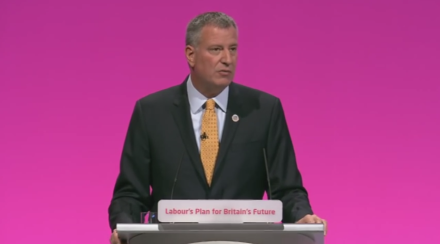“It was never my intention to nibble around the edges with policies of timid maintenance; I ran to take dead aim at the crisis of our time” said New York Mayor Bill de Blasio at conference on Wednesday.

He explained how his Mayoral campaign began, with a few hundred people gathered outside his house; he was dismissed as naive and populist. But New Yorkers recognised his ‘Tale of Two Cities’ – of a ballooning gap between the richest and the rest – and ignored the establishment lament that speaking of inequality is “unconstructive, divisive… harmful.” He swept to a convincing victory.
London is not too dissimilar. We are regularly told we live in the ‘greatest city in the world’ (main rival: New York), home to some of the world’s biggest businesses and richest people, its most highly-rated restaurants and art and music and sport, and we regularly takes top spot in rankings of the ‘world’s best cities’.
But a closer look reveals we tend to score well on all the things that don’t much matter to most citizens – ‘technology readiness’, ‘economic clout’, business-friendly tax rates or the convenience of the time-zone for financial trading – and perform very badly on those indicators that actually affect the quality of life of most Londoners – the cost of living, housing and transport, access to green space, health, safety, or a sense of community. On Wednesday, as de Blasio was speaking, another survey declared London the world’s most expensive city.
A third of our children grow up in poverty. The poorest Londoners can die up to 25 years earlier than the richest. Our highest-paid executives earnt more by January 8th than the average Briton will earn all year. The average house price increased by twice the average wage in 2013.
The greatest city in the world, perhaps, but for whom? And at what?
Our third London Paper – launched today – draws on ideas shared on Changing London over last winter to argue that we need a new definition of success for our city. The ever-growing inequality between the richest and the poorest – increasingly between the richest and the rest – is not simply an unfortunate by-product of progress but its antithesis. The public agree – three quarters of Londoners would support government action to close the gap between low and high earners.
We suggest four principles to underpin a new vision for London:
On poverty: Having enough to live on should be an entitlement in a rich city, not a privilege
On wealth: Remuneration distorted beyond the dreams of avarice is no more useful here and no more welcome than abject poverty.
On business: Businesses of good character are defined not by shareholder return or contribution to GDP, but by the difference they makes to the lives of Londoners.
On housing: Houses in London are for people to live in and there must be enough for everyone. They should no longer be mistaken for investment vehicles.
Each principle leads to a series of practical recommendations – on everything from pay ratios and voluntary taxation to the living wage and well-paid apprenticeships.
But unlike de Blasio, the London mayor currently lacks executive power over most of these major levers – taxes, benefits, wages – to challenge inequality. One solution is to concentrate on transport, planning and the police and leave inequality alone, but that would be a criminal waste of the unprecedented profile and platform the London mayor holds.
Or they could take advantage of their profile and their democratic legitimacy to become a formidable activist on behalf of all citizens; telling a new story about our city and pressuring and cajoling and publicly holding to account. For example, we suggest they could buy a People’s Share in each of London’s largest companies, and represent us at the AGM, demanding a living wage and fair pay at the top. Bogota’s former Mayor Antanas Mockus perfected the activist style – using mime artists to reduce traffic deaths, organising city-wide women only nights to improve safety, and persuading 63,000 residents to pay a voluntary extra tax.
Within days of the last vote being cast next May Labour’s Mayoral hopefuls will be hitting the campaign trail in earnest. They should take heart from de Blasio’s victory and be bold. This is not quick-fix politics: it calls for sustained stewardship of our city and its economy. But a brave mayor could lead that conversation, challenge the orthodoxy and change not just London but the national trajectory too.




More from LabourList
‘Labour is being badly misled on housing’
Reeves bets on patience over populism
‘Energy efficiency changes must work for older private renters’